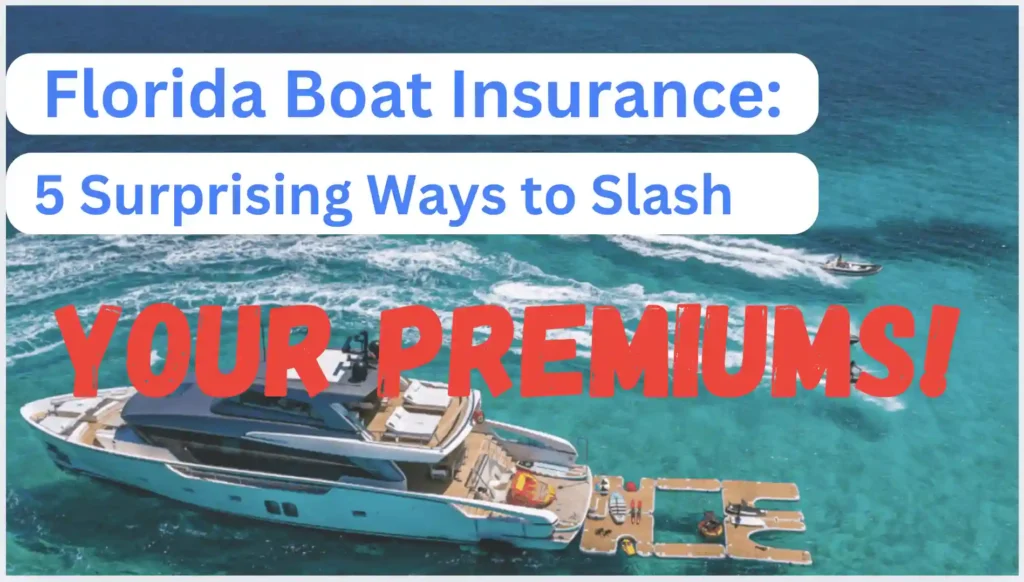Florida is known for its picturesque coastlines, year-round boating weather, and abundant marine life—making it a boating paradise.
But with paradise comes additional risks: hurricanes, year-round usage, and higher theft rates can quickly drive up insurance premiums.
So, how much is boat insurance in Florida? While some owners may pay as little as $300 annually, others face costs exceeding $1,000 depending on their boat type, coverage level, and personal risk factors.
In this guide, you’ll learn:
- Factors that affect boat insurance costs in Florida
- Estimated premium ranges for popular boat types
- Essential coverage options (especially for coastal areas)
- Money-saving tips specific to Florida boaters
- A FAQ section addressing common concerns

Why Florida Boat Insurance Costs Vary
Below, we break down the primary reasons why insurance premiums often differ from one Sunshine State boater to another.
Coastal Risks & Hurricanes
- Hurricane Exposure: Florida’s coastline is prone to tropical storms and hurricanes, which can result in higher premiums or storm-specific deductibles.
- Year-Round Use: Boaters in colder states may only operate a few months a year, while Florida’s warm climate allows near-constant boating—elevating overall risk for insurers.
Example: A 20-foot center console in Pensacola might cost more to insure than a comparable boat in inland Georgia, simply because Florida’s coastal location poses a greater storm threat.
Theft & Vandalism Rates
- High Tourism: Florida’s busy beaches and marinas attract more visitors—and potential thieves.
- Top Theft States: Certain Florida regions consistently rank among the nation’s hot spots for boat theft, pushing insurers to raise comprehensive coverage premiums.
Vessel Type & Usage
• Recreational vs. Commercial: A small fishing boat for weekend outings typically carries lower risk than a charter vessel shuttling passengers daily.
• Power & Size: High-horsepower speedboats or large yachts generally cost more to insure than modest runabouts or pontoons.
Coverage Levels
• Liability-Only: Cheaper but limited if your boat sustains damage from storms or collisions.
• Comprehensive & Collision: Offers broader protection—covering theft, weather damage, and accidents—but raises your annual premium.
Average Boat Insurance Costs in Florida
While actual quotes vary, here’s a general estimate for different vessel categories operating in the Sunshine State.
| Boat Type | Estimated Annual Premium | Notes |
|---|---|---|
| Small Fishing Boat (16–20 ft) | $300–$450 | Lower horsepower, inland lakes/rivers (if not on the coast) |
| Pontoon Boat | $350–$550 | Generally moderate speeds; still subject to theft/weather |
| Center Console (20–25 ft) | $400–$700 | Popular inshore/offshore fishing; moderate to high risk |
| 6-Pack Charter (Commercial) | $600–$1,200+ | Passengers onboard, higher liability, frequent usage |
| Sailboat (25–35 ft) | $450–$800 | Sails and masts can increase repair costs; hurricane exposure |
| Luxury Yacht (35+ ft) | $1,000–$2,000+ | High-value, greater theft risk, costly to repair |
Note: These figures are broad estimates. Factors like your driving (and boating) record, claims history, and whether you bundle multiple policies (auto, home) with the same insurer can significantly impact your final quote.
Mark’s 22-Foot Center Console in Tampa
- Boat: A 22-foot center console valued at $30,000
- Location: Tampa Bay (hurricane-prone, year-round usage)
- Coverage: Liability ($300,000), collision, comprehensive, on-water towing
- Annual Premium: $600
Key Savings:
- Multi-Policy Discount: Mark bundled his boat insurance with his auto insurance for a 10% premium reduction.
- Boater Safety Course: By completing a state-approved boating safety class, Mark secured an additional 5% discount.
Essential Coverages for Florida Boaters
While liability-only may be cheaper, it often leaves big gaps for coastal boaters. Here’s what you should consider.
Liability Insurance
- Coverage Scope: Pays for damages or injuries you cause to others.
- Florida Reality: Busy waterways increase the likelihood of accidents, making liability a must-have.
Comprehensive & Collision
- Comprehensive: Protects against theft, vandalism, weather damage (e.g., hurricanes), and animal-related incidents.
- Collision: Covers repair or replacement costs for your boat after an accident, regardless of fault.
On-Water Towing & Salvage
- Why It’s Important: Running out of fuel or experiencing engine trouble can leave you stranded far from shore. Towing on water can easily cost $200–$500 per incident.
- Salvage Costs: Storms can push boats ashore or sink them; salvage fees can run into the thousands without proper coverage.
Uninsured/Underinsured Boater
- What It Covers: Medical bills and property damage if the at-fault boater has insufficient or no insurance.
- Florida Consideration: Many casual boaters may lack robust insurance, leaving you exposed in a collision.
Practical Ways to Lower Your Florida Boat Insurance Costs
Here’s how to keep coverage comprehensive while easing the burden on your wallet.
Bundle Your Policies
- Multi-Policy Discounts: Combining boat, home, and auto insurance with one provider can knock off 5–20%.
- Provider Loyalty: Some insurers offer loyalty programs or additional discounts for long-standing customers.
Take Boater Safety Courses
- State-Approved Classes: Florida requires a Boating Safety Education Identification Card for some operators, and completing advanced courses can yield 5–15% in discounts.
- Insurance Bonus: Demonstrating responsible operation reduces your perceived risk in the eyes of insurers.
Maintain a Clean Driving Record
- On the Road & Water: Auto accidents and DUIs can raise your boat insurance premium.
- Accident-Free Discount: Insurers reward boaters with no recent claims or traffic violations.
Opt for a Higher Deductible
- Lower Premium: Increasing your deductible from, say, $500 to $1,000 often reduces annual costs.
- Risk-Reward Tradeoff: Ensure you can afford the higher out-of-pocket expense if you file a claim.
Frequently Asked Questions
No, Florida does not legally mandate boat insurance for most vessels. However, many marinas and lenders require proof of coverage before letting you dock or finance a boat. It’s also financially wise to carry at least liability insurance.
Bundle policies with the same insurer (home, auto, boat).
Complete boater safety courses for a discount.
Maintain a clean driving record to lower your perceived risk.
Ask about seasonal or lay-up coverage if you rarely boat in winter.
Most homeowners policies offer limited or no boat coverage, especially for theft or damage outside your property. Relying solely on homeowners insurance for your boat is risky, particularly given Florida’s higher storm and theft exposure.
Some insurers allow seasonal coverage where you reduce certain coverage elements when the boat is in storage.
Discuss a “lay-up period” with your insurer for potential premium savings.
Yes. Many Florida insurers factor in credit history when calculating premiums, viewing higher credit scores as indicative of responsible payment habits.
Final Thoughts: Balancing Coverage & Cost in Florida
From the Panhandle to the Florida Keys, the Sunshine State’s aquatic landscapes come with inherent risks—hurricanes, year-round usage, and high theft rates.
While premiums typically start around $300–$400 annually for smaller vessels, they can climb to $1,000+ for larger or commercial boats needing comprehensive coverage.
Ultimately, how much you’ll pay depends on factors like boat type, location, coverage choices, and personal insurance history.
By bundling policies, completing state-approved boater education, and maintaining a clean record, you can significantly reduce your insurance bill without sacrificing peace of mind.
Whether you’re cruising along the Gulf Coast or exploring inland lakes, having the right policy in place ensures your investment—and your financial well-being—stays protected against life’s unexpected waves.
Compare Quotes & Seek Discounts
Collect details about your vessel (make, model, value, usage) and shop around—ask multiple insurers about:
1. Multi-policy discounts
2. Safe boater or loyalty programs
3. Seasonal or lay-up coverage options
The perfect balance between affordable premiums and comprehensive coverage is achievable with a bit of research and strategic planning. Safe (and insured) boating, Florida!

Kayla Cavanaugh, founder of SaveYourBoat.com, is an experienced insurance agent with over 10 years in boat and yacht insurance. She is dedicated to educating boat owners on safety and insurance essentials. Through her blog, Kayla provides expert advice to help protect vessels and ensure worry-free adventures on the water.